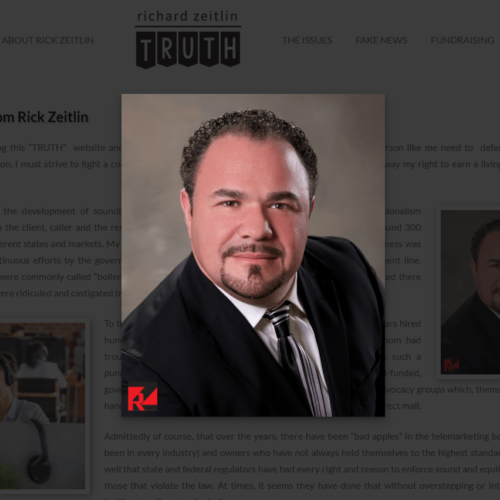Introduction
Political donors filed a class action lawsuit this week against Richard Zeitlin, a Las Vegas-based telemarketer they accuse of facilitating a “massive money-making scheme.”
Zeitlin was the focus of an investigation by the Center for Public Integrity in 2019.
The lawsuit alleges Zeitlin and his companies violated the Telephone Consumer Protection Act by “siphoning … donations out in the form of enormous profits.” It was filed in the U.S. District Court for the Middle District of Pennsylvania on Monday.
The donors allege they were duped by telemarketers calling on behalf of “scam PACs,” which are political action committees that raise significant sums of money from donors but spend little — if anything — on the people they claim to champion, such as children with leukemia, women with breast cancer, police officers, firefighters and veterans.
“Instead of putting the millions of dollars raised by the Zeitlin companies to work for these noble causes, the scam PACs and their complicit treasurers (who also profit from this massive scheme), funnel nearly all of the funds back to the Zeitlin companies through an array of bogus and inflated overhead expenditures,” the lawsuit states.
The Telephone Consumer Protection Act prohibits calling a cell phone using automatic dialing systems or artificial voices (also known as soundboard technology) without prior consent. Violating the act carries fines of $500 to $1,500 per phone call.
“The goal is to stop a clearly prohibited action and to compensate the people who have been targeted,” said Eric Weitz, the plaintiffs’ lead attorney, whose law firm is based in Philadelphia.
The complaint against Zeitlin calls attention to the numerous clients who contract with his companies for fundraising services. Among them: William Pollock, a Las Vegas police officer who resigned after Public Integrity’s investigation into his questionable fundraising practices for the Police Officers Defense Alliance PAC.
The lawsuit, which cites Public Integrity’s reporting, seeks compensation for the plaintiffs and “disgorgement of defendants’ ill-gotten gains.”
Attorneys for Zeitlin and the plaintiffs did not immediately respond to a request for comment.
Brett Kappel, a campaign finance attorney with the Washington, D.C.-based law firm Harmon Curran, said the lawsuit is “another example of how dysfunctional the [federal government] has become, that people have to resort to litigation to protect themselves from scam PACs.”
The Federal Election Commission regulates political action committees, and the Federal Communications Commission enforces the Telephone Consumer Protection Act. The Federal Trade Commission, a regulator tasked with protecting consumers, in 2020 banned Mark Gevlan, the leader of a separate telemarketing ring based in New Jersey, from fundraising and fined him and his co-defendants $58.5 million. (Read Public Integrity’s 2017 investigation into Gelvan here.)
The plaintiffs named in the lawsuit live in Pennsylvania, Alabama and Texas, but they represent a class of donors across the country who were contacted by Zeitlin’s companies.
Public Integrity reported that between 2006 and 2019, Zeitlin’s companies raised at least $153.1 million on behalf of political action committees and charities, but they kept $133.1 million of that — or 87%.
Zeitlin has been fundraising for more than a dozen charities and political action committees for decades. In 2009, the California attorney general filed a lawsuit against one of his telemarketing companies, Courtesy Call, and one of its charity clients, alleging they made “false, deceptive, and misleading statements to donors.” Courtesy Call denied the allegations in a response to the lawsuit, but agreed to settle for $17,000 without admitting wrongdoing.
The Federal Trade Commission and attorneys general in various states shut down at least five of the charity clients that contracted with Courtesy Call for allegedly misleading donors. Zeitlin was not a party in any of those lawsuits, nor were he or his companies accused of any wrongdoing.
Joel Hansen, Zeitlin’s attorney, previously told Public Integrity that Zeitlin and his companies “are certainly not responsible for the alleged actions of a very small number of previous charity clients.” Nor is it Zeitlin’s job to “police or otherwise investigate” the practices of his clients, he said.
The FTC was investigating whether two of Zeitlin’s previous companies, Donor Relations and Courtesy Call, were “engaging in unfair or deceptive acts or practices,” according to a court document filed by the commission in February 2018.
But the companies did not cooperate, according to the FTC, failing to meet deadlines and sending “patently inaccurate” documents. The FTC dropped the investigation in the fall of last year, citing an ongoing grand jury investigation involving Courtesy Call and Donor Relations.
Sarah Kleiner is a senior reporter at the Center for Public Integrity. She can be reached at skleiner@publicintegrity.org. Follow her on Twitter at @bysarahkleiner.
Help support this work
Public Integrity doesn’t have paywalls and doesn’t accept advertising so that our investigative reporting can have the widest possible impact on addressing inequality in the U.S. Our work is possible thanks to support from people like you. Donate now.
Read more in Money and Democracy
Veterans Charities
Telemarketer at center of Public Integrity investigation banned from fundraising
Government rules Mark Gelvan and his co-defendants must pay fines.
Coronavirus and Inequality
Embattled Las Vegas telemarketer got COVID-19 business loans
One company that received a PPP loan was part of a Public Integrity investigation that found few donations went to the causes championed.





Join the conversation
Show Comments